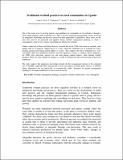| dc.contributor.author | Iyango, L | |
| dc.contributor.author | Kiwazi, F | |
| dc.contributor.author | Tindamanyire, T | |
| dc.contributor.author | Kaganzi, E | |
| dc.contributor.author | Busulwa, H | |
| dc.contributor.author | Mafabi, P | |
| dc.date.accessioned | 2015-11-12T06:14:40Z | |
| dc.date.available | 2015-11-12T06:14:40Z | |
| dc.date.issued | 2005 | |
| dc.identifier.citation | Traditional wetland practices in rural communities in Uganda Iyango L., Kiwazi F., Tindamanyire T., Kaganzi E., Busulwa H. and Mafabi P. Wetlands Inspection Division, Ministry of Water Lands and Environment, P. O. Box 9629, Kampala, Uganda | en_US |
| dc.identifier.uri | http://hdl.handle.net/11671/822 | |
| dc.description.abstract | One of the major ways to develop policies and guidelines for sustainable use of wetlands is through a
better understanding of their traditional uses. This is because traditional management systems are based
on indigenous knowledge and practices passed on from generation to generation. These ideas are the
ones that need to be promoted and applied during wetland management planning, as there is
consequently a need to test a variety of potential use options for wetlands.
Studies conducted in Busia and Rakai districts, revealed that in the 1940s cultivation in wetlands, sand
mining and use of papyrus, ranked lowest (1 score), while the traditional use of wetlands for water,
hunting, grazing and fishing ranked highest (5 scores). This suggests that these traditional uses were
sustainable under low population densities and had regulatory systems, a situation which changed in
the 1990s with cultivation, papyrus use and sand mining ranking highest, while hunting steadily
declined. There are some changes in climate as a result of wetland use and conversion due to increased
population.
The study suggests that indigenous knowledge provides the best management options to the continued
use of wetlands especially those that provide at least one known essential good, service, or attribute
where alternatives are not practically or economically viable. Strategies for proper management
planning for wetlands intended for use have been discussed. | en_US |
| dc.language.iso | en | en_US |
| dc.publisher | Lake Victoria Environmental Management Project (LVEMP) | en_US |
| dc.subject | Wetlands management | en_US |
| dc.subject | Planning | en_US |
| dc.subject | Sustainable | en_US |
| dc.subject | Benefits | en_US |
| dc.subject | Beneficiaries | en_US |
| dc.subject | Vital | en_US |
| dc.subject | Endangered | en_US |
| dc.title | Traditional wetland practices in rural communities in Uganda | en_US |
| dc.type | Article | en_US |

